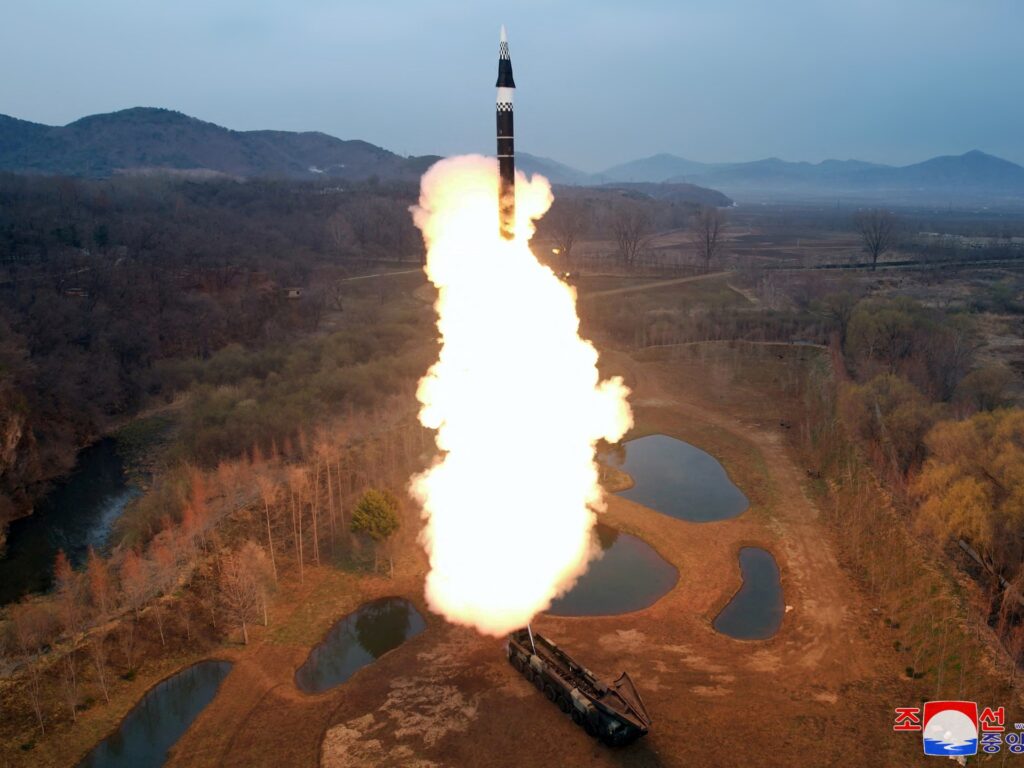US Secretary of State Antony Blinken met with South Korean Acting President Choi Sang-mok in Seoul.
North Korea launched a ballistic missile into the sea at the same time top US diplomats were meeting in South Korea’s capital, Seoul.
According to the South Korean military, the missile was fired toward the east around noon (3 p.m. Japan time) shortly after U.S. Secretary of State Antony Blinken met with South Korean Acting President Choi Sang-mok.
The military announced, “Our military detected a projectile believed to be an intermediate-range ballistic missile.”
After the missile flew some 1,100 kilometers (680 miles) before landing in waters between the Korean Peninsula and Japan, the military announced that the South Korean government had “strengthened surveillance and vigilance” against future launches. did.
According to Japan, the missile appears to have fallen into the sea. The South Korean military added that South Korea was “coordinating closely with the United States and Japan” regarding the launch.
Japan’s Defense Ministry said the missile landed outside its exclusive economic zone and there were no reports of damage to ships or aircraft.

Blinken and South Korean Foreign Minister Cho Tae-yeol condemned the launch in a joint news conference, with Washington’s top diplomat calling it “another violation of multiple U.N. Security Council resolutions.”
Monday’s launch was the first since Nov. 5, when North Korea fired at least seven short-range ballistic missiles off its east coast.
Al Jazeera’s Patrick Fok, reporting from Seoul, said the timing of the missile launch was “important” for several reasons.
“It comes just weeks before Donald Trump’s inauguration as president of the United States,” he said. “This (missile launch) is also important because North Korea has remained relatively calm since this political crisis (the December coup attempt) erupted here.”
Last month, South Korean National Assembly members passed a resolution to impeach and suspend President Yoon Seok-yeol after his Dec. 3 declaration of martial law shocked the country. Yun’s impeachment trial is being heard at the Constitutional Court, and South Korean investigative authorities have requested an arrest warrant for him.
“Impossible commitment”
According to a statement from the State Department, the US Secretary of State reiterated the US’s “firm commitment” to the defense of South Korea and discussed “how the two countries will work together to further strengthen bilateral and trilateral cooperation with Japan. He said that he had a meeting with Acting President Choi regarding the matter.
Until the temporary imposition of martial law on Dec. 3, Yun was a darling of President Joe Biden’s administration for his pro-American policies on the world stage.
Yun pleased the United States by seeking to turn the page on decades of friction with Japan, another U.S. ally and where thousands of American troops are stationed.
In 2023, Yun participated in a landmark three-way meeting with Biden and Japan’s then-Prime Minister Fumio Kishida at the Camp David presidential training camp, which included a promise to increase intelligence cooperation on North Korea.
Choi’s office said in a statement that South Korea will continue to abide by “the principles and agreements of the Camp David summit.”
The acting president said, “South Korea will maintain a foreign and security policy based on the strong Korea-US alliance and trilateral cooperation between Korea, the US, and Japan.”
Cooperation between North Korea and Russia
Blinken said Monday that the United States believes Russia is expanding space cooperation with North Korea in exchange for military contributions in the fight against Ukraine.
“The DPRK (North Korea) already has Russian military equipment and training. We now have reason to believe that Russia intends to share advanced space and satellite technology with North Korea,” Blinken said. said.
Blinken said more than 1,000 North Korean troops had been killed or wounded in the war with Ukraine.
Additionally, Blinken said the United States believes Russia “may be close” to formally recognizing North Korea’s nuclear state status.



